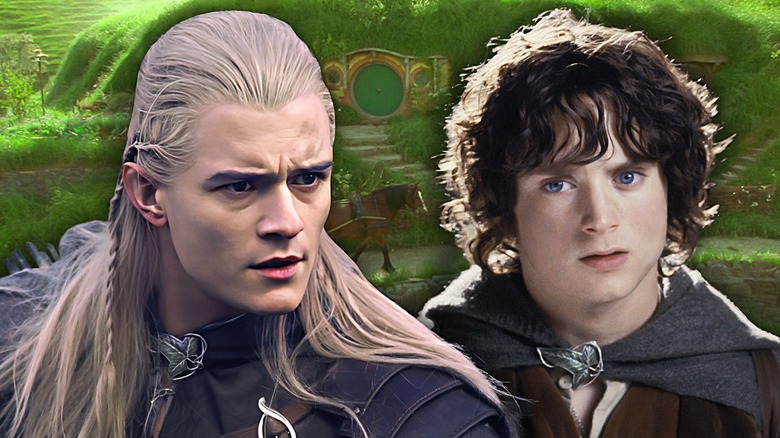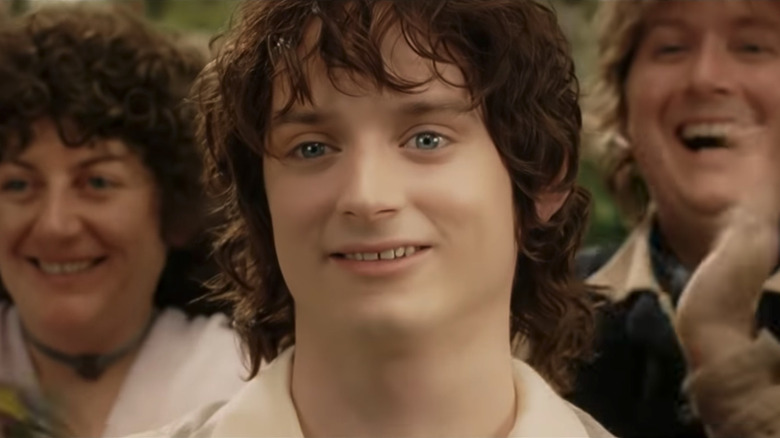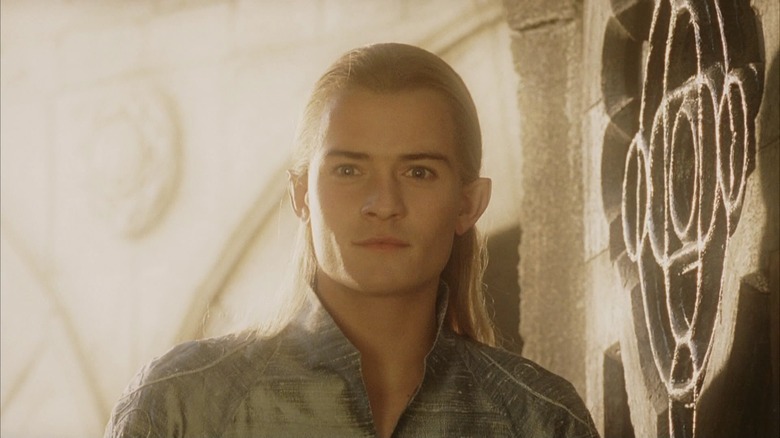A Popular Lord Of The Rings Theory Is Nonsense And Completely False
Over the years, "The Lord of the Rings" has spawned several popular fan theories. Some are fun crossovers, like a clever argument connecting "Lord of the Rings" to "Snow White." Other Lord of the Rings theories would change everything, such as the outlandish suggestion that Wormtongue wields a Ring of Power or that Tom Bombadil is the Witch-king. And then some theories are just plain silly, including the popular idea that Frodo doesn't know Legolas' name.
However, J.R.R. Tolkien's books have instances of dialogue between the two characters, and one fan discovered indisputable proof that Frodo knows his companion's name — by the end of Peter Jackson's movies, at least. Audiences love to point out that Legolas and Frodo hardly interact throughout the films; however, it doesn't take much prodding for the theory to be debunked.
Let's start with the obvious. Frodo and Legolas travel side by side for weeks. It would be nothing short of outright hostility for the two to never talk during that time. That said, the question here is whether Frodo knows Legolas by name. A Reddit post from user Icy_Statement_2410 confirms he does, showing a picture of Frodo writing in a book at the end of "The Return of the King." The name "Legolas" can be seen, barely visible halfway down the page Frodo's left hand is over. As the Redditor points out, Frodo may have learned it after his travels, but either way, the scene offers indisputable proof that the Ringbearer knows Legolas' name by the story's end.
Frodo basically writes The Lord of the Rings
The idea that Frodo would have written down Legolas' name comes straight from J.R.R. Tolkien's texts. The book the hobbit writes in "The Return of the King" is called "The Red Book of Westmarch," and it is essentially the in-universe version of "The Hobbit" and "The Lord of the Rings." Bilbo, Pippin, Merry, and Sam all add to it. For example, Bilbo includes a sort of diary and compendium of his translations, while Pippin and Merry supply extraneous research.
Frodo is also a huge contributor. At the end of the "Return of the King" book, he doesn't just write down the events of the War of the Ring. He gives the book an absurdly long name: "The Downfall of the Lord of the Rings and the Return of the King (as seen by the Little People; being the memoirs of Bilbo and Frodo of the Shire, supplemented by the accounts of their friends and the learning of the Wise.) Together with extracts from Books of Lore translated by Bilbo in Rivendell."
In other words, Frodo organizes, assembles, and records the Red Book of Westmarch, personally adding critical passages that recount the War of the Ring — the part of the story including Legolas. He undoubtedly had to recall and write the elf's name numerous times during this process.
When do Frodo and Legolas interact with one another?
Okay, so it's possible to prove that Frodo knows Legolas' name by the end of the story. But, the reality is that the two are comfortable acquaintances throughout their adventures, particularly in the second half of "The Fellowship of the Ring." Why that specific chunk of narrative? Because that's when they meet in Rivendell and travel together.
This is the point where Legolas tells Frodo that he has his bow. In the book, the two have multiple interactions. As Quora user Ardent1313 points out, the pair of adventurers talk in-depth as part of a larger conversation when they're in the boats sailing down the Great River. They discuss how long they spent in Lothlórien and have a back-and-forth dialogue.
There are also multiple moments when it would be awkward if the two didn't interact — even if no names are mentioned. For instance, in Moria, Legolas follows Frodo on guard duty (presumably not for the first time). When they get to Lothlórien, Legolas, Frodo, and Sam meet the local Elves and talk to them. Legolas' name is spoken right in front of Frodo.
The truth is, there are a lot of characters in "The Lord of the Rings," and there was only so much room J.R.R. Tolkien had to fit interactions between all of them. However, plenty of circumstantial evidence (as well as the on-screen proof of Frodo's book) allows for the assumption that the two weren't just acquainted. They actually knew each other's names.


